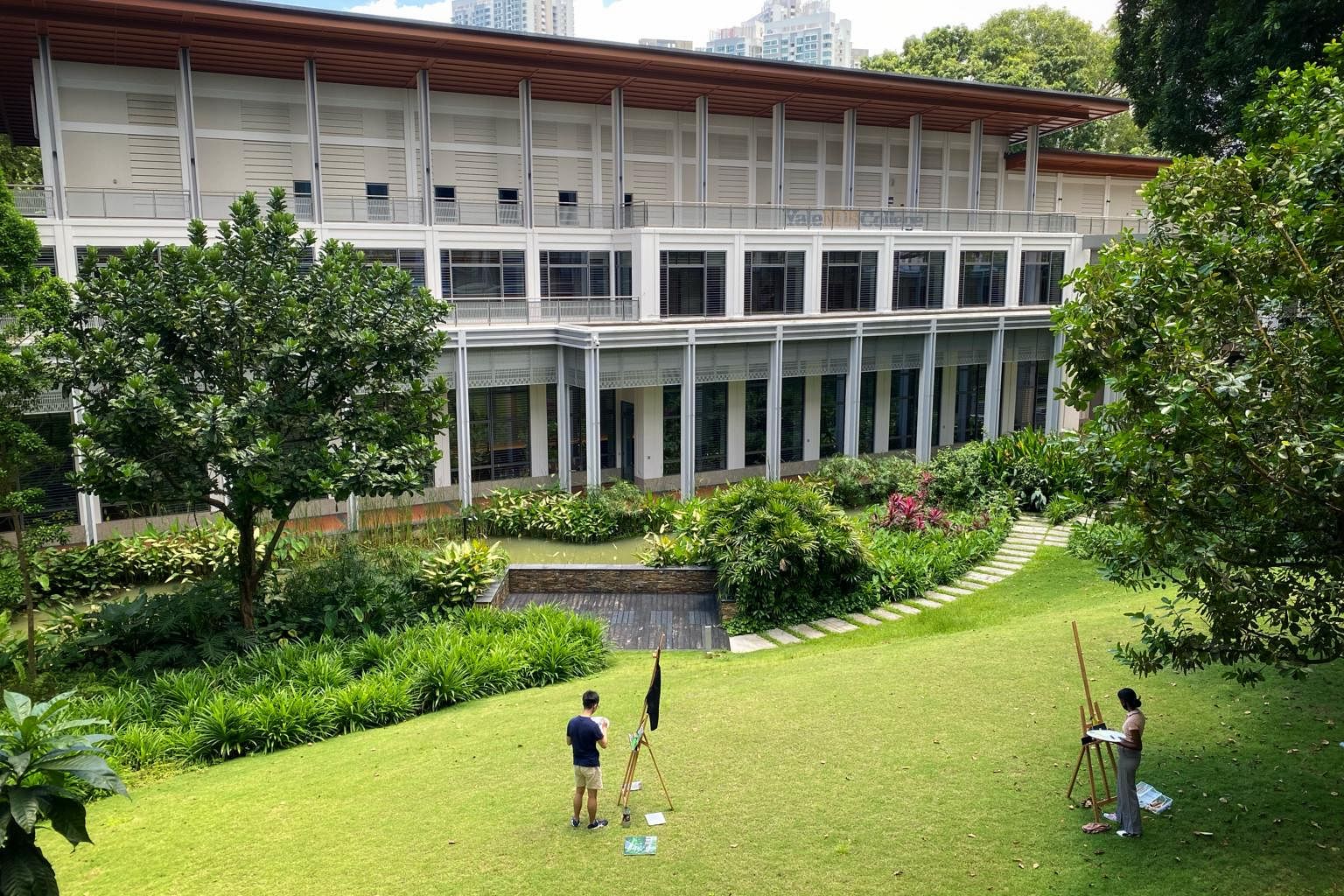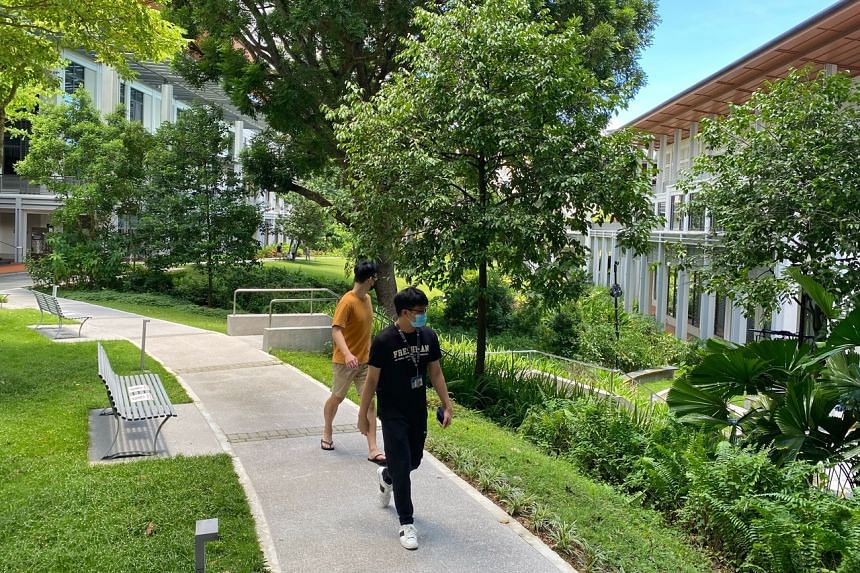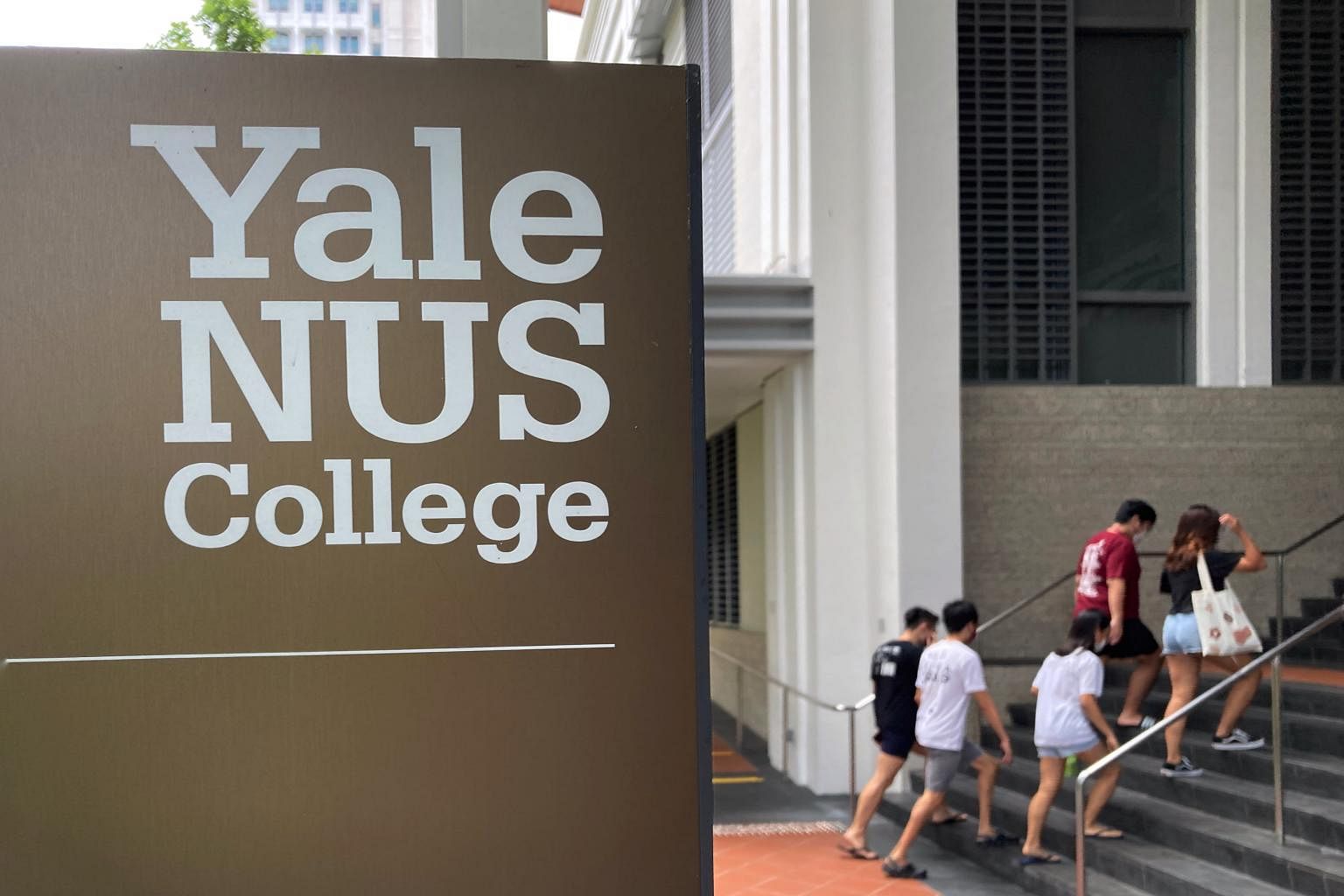SINGAPORE – Extra than a 7 days because the shock announcement that Yale-NUS School will near its doors in 2025, learners and alumni are nevertheless questioning if they will get a extra in-depth explanation of the selection.
On Aug 27, the Countrywide College of Singapore (NUS) said in a statement that this year’s intake at Yale-NUS, a liberal arts institution that it established up with America’s Yale University in 2011, would be its final.
Contacting the shift a “merger”, NUS explained the very best elements of Yale-NUS and its very own 20-year-previous College Students Programme (USP) will form the foundation of a yet-to-be-named new university, which will open future 12 months.
NUS president Tan Eng Chye mentioned NUS was exceptionally proud of what Yale-NUS has attained in the previous 10 a long time, and that the working experience has contributed to a reimagining of undergraduate education at NUS.
“Our sturdy belief in the significance of interdisciplinarity, forged by means of our worthwhile partnership, has led to the establishment of the New College,” he additional.
In a assertion from New Haven, Connecticut, Yale president Peter Salovey available his best needs to the new university, and thanked the Singapore Governing administration for having designed the partnership feasible.
The arrangement signed in 2011 involving NUS and Yale had offered possibly celebration the solution to withdraw in 2025.
NUS officers explained that saying the determination in advance will allow existing undergraduates to finish their studies as prepared.
Inspite of the amicable comments from university leaders, several students, alumni and school associates have expressed anger and unhappiness at the final decision and the lack of prior session.
Several meetings and townhall periods have been called.
More than 13,000 men and women have signed an online petition titled Reverse the Mergers and #NoMoreTopDown initiated by learners from Yale-NUS and NUS, calling on NUS to reverse the final decision.
The petition contains a phone for NUS to reverse two other mergers – involving the College of Engineering and the Faculty of Design and Surroundings to type the College of Structure and Engineering, which was declared on Aug 27, and between the School of Arts and Social Sciences and the Faculty of Science to kind the School of Humanities and Sciences, which was introduced in December past 12 months.
There is also substantially speculation on the “true” reasons for what a lot of in the Yale-NUS local community see as the closure of Yale-NUS.
Interviews with final decision-makers, college students, alumni and faculty of NUS and Yale-NUS have posited 3 probable motives for the selection:
• NUS wanting to go it by yourself in providing a liberal arts curriculum that is in line with its priorities
• Concerns more than Yale-NUS’ funding and the significant costs of a liberal arts college education to taxpayers and college students
• Controversies the university has been embroiled in
NUS goes it by itself
Professor Tan has explained the shift as an evolution of USP and Yale-NUS into a new faculty.
“The New Faculty will supply students the option to benefit from an immersive, interdisciplinary liberal arts education that really importantly features higher accessibility to numerous pathways, disciplines and specialisations throughout the NUS ecosystem,” he has explained.
Ambassador-at-Significant Chan Heng Chee, who sits on the Yale-NUS School board, said the primary purpose of the shift was to “democratise” liberal arts education and learning in Singapore and make it offered and obtainable to a lot more nearby college students.
Yale-NUS did not provide figures on the socio-financial profile of the Singaporeans admitted this calendar year, but said citizens made up 60 per cent of the 240-potent intake.
Of this amount, 154 college students – like long term inhabitants – have been schooled in Singapore, 126 of whom ended up from junior faculties, integrated programme universities and specialised universities. Eight had graduated from the polytechnics.
Professor Chan, a previous head of the political science office at NUS, stressed that NUS, remaining a public college and the flagship university of Singapore, has a national purpose to play to prepare Singaporeans for the demands of the foreseeable future.
“It sees interdisciplinary learning as an significant component of making ready learners for the potential, consequently its work to merge Yale-NUS and USP to have a greater higher education that can accommodate much more students,” she instructed The Sunday Times.
Prof Chan claimed that although Yale-NUS presented a major-notch liberal arts instruction, NUS has to keep evolving the training it provides “to make an education and learning that is proper for the time, and suitable for Singapore”.
When some kind of wide-centered, interdisciplinary programmes have been available at NUS more than many decades, most notably via the USP, Yale-NUS Faculty took liberal arts education to yet another amount.
Its instruction emphasised the complete vary of arts, humanities, and social and organic sciences. The common curriculum it created spanned Western and Asian cultures and perspectives.
Throughout their four-yr, thoroughly residential undergraduate encounter, they master in smaller classes and by collaborating with the college and their peers. There are also a selection of co-curricular programmes and research and investigate chances overseas.
Yale alumnus Michael Montesano echoed Prof Chan’s remarks when he stated that NUS’ determination was dependent on its priorities for the university as a entire.
Dr Montesano, an American who is now a going to senior fellow at a Singapore believe-tank, explained: “Those priorities doubtless mirror aims and constraints relating to Singapore’s present-day social and economic realities, and to a eyesight of how NUS can finest provide Singapore and Singaporeans.
“They are associated to other improvements underneath way at NUS, and they are inherent in NUS’ mission as a countrywide college with a position to engage in in an ever-altering society.”
Prof Chan extra that the modify is part of “a more substantial realignment NUS started out on two decades back, to deliver adaptable, interdisciplinary instruction to additional college students”.
It also follows the development of the Faculty of Humanities and Sciences, and the Higher education of Structure and Engineering introduced about by the merger of the schools of structure and atmosphere, and engineering.
Yale-NUS’ monetary sustainability

An additional thought had been the dilemma of the college’s financial sustainability, claimed Prof Chan.
Yale-NUS had hoped sooner or later to secure as considerably personal funding as top-tier American liberal arts colleges, she claimed.
Worry about the financial product “commenced the dialogue” about what to do with the higher education, she told The Economist not long ago.
On its internet site, Yale-NUS Faculty experiences that as at March this year, its endowment amounted to $429.8 million.
In comparison, Wesleyan College, a liberal arts college in the United States with three moments the quantity of pupils as Yale-NUS, has an endowment of US$1.13 billion (S$1.5 billion). NUS, with a a lot bigger university student body, has an endowment of some $6 billion.
Media experiences have quoted Professor Pericles Lewis, the founding president of Yale-NUS, as stating in recent times that the faculty experienced “a several several years still left” to obtain its fund-elevating targets.
Prof Lewis, who is now Yale University’s vice-president for worldwide system, did not react to queries from The Sunday Occasions on the funding focus on and what assembly it would have intended for the economic sustainability of the faculty.
He was also questioned if college or university resources could be used to decreased tuition and residential college or university fees for pupils to improve the accessibility of a liberal arts schooling here.
Singaporean students who enrolled in Yale-NUS this year would have to fork out $20,000 in tuition expenses and a further $10,000 in school charges – a great deal increased than the $8,200 tuition expenses paid out by Singaporean learners undertaking an arts and social sciences diploma at NUS.
A USP college student entering the arts and social science school this calendar year would also spend $8,200 a yr in tuition fees.
Before the Covid-19 pandemic, they were being demanded to continue to be two a long time in a residential college, which would expense an additional $7,000 a year.
Ms Gerry Tan, 20, an NUS arts and social science university student, stated her have encounter of implementing to Yale-NUS designed her question if a liberal arts education was within just the arrive at of college students from normal Singaporean families if they did not get scholarships.
“My dad and mom are middle-level managers and even though I wished to try for a area in Yale-NUS, they baulked at the costs, which will sum to $120,000 in 4 years,” she reported. “It is out of attain to people like mine.”
Political controversies

Some have asked if the go was since the Singapore Government was unpleasant with the Yale College faculty’s insistence on educational independence, and its stance on challenges like liberty of speech and LGBTQ (lesbian, homosexual, bisexual, transgender and queer) matters.
They level to how, when plans for the college or university had been declared in 2010, Yale college users in the US had expressed fears over tutorial independence of the school and constraints on flexibility of speech in Singapore.
At the opening of the Yale-NUS campus in 2015, Key Minister Lee Hsien Loong experienced stated that to thrive, the college essential a curriculum and ethos that responded to the regional context of Asia.
He explained it essential “to truly feel the excitement of societies on the move, to respond to the zeitgeist, the difficulties, and the priorities of a mounting continent”.
Criticisms from Yale college members appeared to die down just after the school took in its pioneer batch in 2013 and learners praised the arduous liberal arts instruction they had been getting.
Two several years back, the problem of academic independence surfaced all over again when a module named Dissent And Resistance In Singapore was cancelled.
The school informed Singaporean playwright Alfian Sa’at, who was to guide the study course, that it was insufficiently academically demanding and could pose a lawful hazard to the students.
Responding to allegations that the school had caved to political tension in cancelling the module, Prof Lewis carried out an investigation that yielded no evidence of governing administration coercion.
The make a difference arrived up in Parliament. Then Education Minister Ong Ye Kung mentioned “tutorial independence can not be carte blanche for any person to misuse an academic establishment for political advocacy”.
The the latest transfer has drawn issues from 3 Workers’ Occasion MPs who have submitted parliamentary queries asking for a lot more clarity powering the conclusion and whether or not the character of scholar activism in the Yale-NUS campus played a aspect in the conclusion.
Alumnus Daryl Yang, 28, co-founder of student-run group Local community for Advocacy & Political Schooling in Yale-NUS, mentioned: “We might by no means know if political considerations were indeed one of the factors.”
But if it was in actuality a purpose, he said, it may have “backfired” supplied how it has goaded learners throughout NUS and Yale-NUS to arrive jointly and mobilise the #NoMoreTopDown petition.
He felt NUS should place an close to these speculations by ensuring the new faculty adopts Yale-NUS’ policy on educational flexibility, and promise incoming learners to the new college that they will be capable to take a look at their educational passions exterior the classroom the similar way Yale-NUS learners have been ready to.
Prof Chan disagrees with the watch that the transfer was thanks to political aspects.
Whilst the Federal government may possibly have been “worried” with some of the controversies over the years, it is not the major cause for the transform, she claimed.
She reiterated how the conclusion was portion of a larger sized transfer for NUS to adopt a a lot more adaptable, interdisciplinary technique.
Prof Lewis told Yale Every day Information, a university student-operate newspaper in New Haven, very last week that concerns of educational freedom ended up not a variable in the decision to near Yale-NUS.
“The NUS persons and the Authorities have been incredibly supportive of tutorial flexibility at Yale-NUS,” he advised the paper, introducing: “We have been quite glad with the capacity of Yale-NUS students and faculty to workout their educational independence and have a truly fantastic encounter there. That has not been a problem from our position of look at.”
In the meantime, get the job done has started off on the new college or university.
NUS has announced a planning committee chaired by NUS senior deputy president and provost Ho Teck Hua and comprising leaders from USP, Yale-NUS and Yale College.
But some pupils, alumni and school customers interviewed are pessimistic that the new school will be able to recreate the Yale-NUS distinctive design of education that manufactured probable modest class dimensions, near collaborations amongst personnel and learners, and a a lot more participatory strategy to mastering.

Yale-NUS Affiliate Professor Matthew Schneider-Mayerson, an interdisciplinary scholar of environmental research, praised the function of a person of his pupils.
“It took a decade to build the intellectual neighborhood and culture that developed this do the job,” he mentioned on Twitter, incorporating that it was manufactured possible by the “warm and egalitarian romance in between learners and college” and his student’s dedication and hope that her function would enable to educate a new technology of students to tackle the local climate crisis.
Other people say these criticisms will die down as soon as the new college is set up and offers its have exclusive product of instruction.
A retired tutorial who has held management positions in community universities pointed out that this was not the to start with partnership a nearby college had with a prestigious abroad university.
Singapore Management University’s arrangement with the Wharton Company College finished just after 5 years, and the Singapore College of Technological know-how and Layout (SUTD) mentioned goodbye to its training collaboration with the Massachusetts Institute of Technologies (MIT) in 2017, after 7 yrs. SUTD’s exploration collaboration with MIT finished in June very last 12 months.
Of Yale-NUS and NUS’ new route, the retired educational explained: “The two universities are nonetheless standing and carrying out improved than at any time. Their pupils appreciate great occupation prospective customers. If we want the very best features of liberal arts schooling from Yale-NUS to carry on benefiting our college students, then I am self-assured we can do it, and do it very well.”




